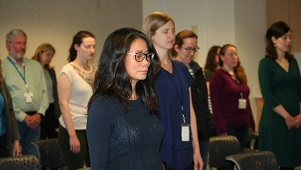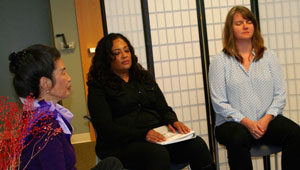Can you lose and maintain weight by eating mindfully?

Kaiser Permanente colleagues’ personal and professional paths converge in a pilot project
Among what many have lost to COVID-19—money, health, well-being, even lives—is the synergy that can come from working close to one another. “It was fate,” says Robin Garcia, MPH, RDN, when she started working at Kaiser Permanente Washington Health Research Institute (KPWHRI) over 2 years ago and happened to be assigned a workspace next to David Arterburn, MD, MPH.
They got to talking and discovered that their interests—hers in community nutrition and his in obesity treatment—were similar, yet complementary. “Since then, we’ve been on quite a journey of exploration together,” says Dr. Arterburn, a senior investigator at KPWHRI.
Since her own experience since college, “bouncing back from disordered eating,” Ms. Garcia says she’s been passionate about nutrition. A project manager for both the institute’s Survey Research Program and Research Operations, she was delighted to join Dr. Arterburn, Leah Tuzzio, MPH, Jane Anau, and Caitlin Dorsey on a 2019 project conducting an environmental scan of all Kaiser Permanente regions’ weight management programs. From plant-based to ketogenic, online to in-person, and evidence-based to not so well studied… You name it, they reviewed it together.
Practical, affordable, and scalable
They also discovered that Kaiser Permanente Washington has limited weight management offerings for its members. So Ms. Garcia and Dr. Arterburn wanted to develop a new line of research to identify a program that works for the 2 in 3 Kaiser Permanente patients who—like their fellow Americans—are living with overweight or obesity. “It would be great if everyone could have an individualized Cadillac weight-management program, complete with a personal trainer and chef,” Dr. Arterburn says. “That would be effective, but never affordable. We need an intervention that is practical, affordable, and scalable. And we need a program that can address peoples’ deep-rooted behaviors around eating.”
As fate would have it, Dr. Arterburn happened to hear a speech by Judson Brewer, MD, PhD, director of research and innovation at the Brown University Mindfulness Center. “Dr. Brewer had trained in the same lineage of mindfulness that I’d been practicing for years: Vipassana, or insight meditation,” Dr. Arterburn says.
After working with Jon Kabat-Zinn, PhD, on mindfulness-based stress reduction, Dr. Brewer developed 3 mindfulness-based mobile apps to help people with behavior change, including Unwinding Anxiety, Craving to Quit (for smoking)—and Eat Right Now. All 3 rely on frequent, short, app-prompted sessions of mindfulness—engaging with their habits in the present moment—throughout the day. The goal is to use the power of mobile devices to integrate mindfulness into everyday life to help change behavior and break habit loops.
Dr. Brewer’s approach to habit change is practical and can yield quick results, according to Dr. Arterburn, who adds: “I have a long history of anxiety, so with the extra uncertainty of the pandemic, I decided that I would try using the Unwinding Anxiety app myself. I’ve found that it has been more helpful to me in a few months than many years of psychotherapy combined.”
And talk about scalability: The Unwinding Anxiety app has recently gained broad acceptance. In response to the stress of the pandemic, all Arizonans are now being offered free use of it for 3 months from Blue Cross Blue Shield of Arizona and Sharecare, which recently acquired Dr. Brewer’s company MindSciences, Inc.
“Likewise, the Eat Right Now app is a very innovative and promising way of dealing with eating behaviors, especially emotional eating—to manage weight in the long term,” Dr. Arterburn says. When people feel the urge to eat, the app encourages them to get curious about their body sensations and gauge whether they’re truly hungry—or just reaching for food out of habit. The idea is that people’s relationship to food can change pretty quickly when they’re being more mindful about the “why, what, and how” of eating.
Launching pilot project
After learning about the Eat Right Now program, Dr. Arterburn reached out to Dr. Brewer and learned that the app had 6-month pilot data showing a 40% reduction in craving-related eating, but more research was needed to demonstrate its impact on weight. Thanks to funding from the KPWHRI Innovation Fund, Ms. Garcia and Dr. Arterburn plan to launch a pilot project in October 2020, starting with 20 Kaiser Permanente Washington patients. In March 2020, toward the start of the COVID-19 pandemic, they both started a formal training program for Eat Right Now—training to be facilitators for the app.
Unlike Dr. Arterburn, Ms. Garcia hadn’t been a regular meditator. “This approach is so new and different for me,” she says. “I’d never been curious about the ‘why’ of my eating before. It’s been really fun for me. But it may not be for everyone. Some people may prefer a more regimented approach, including calorie counting.”
“Different people may need different options,” Dr. Arterburn agrees. “We’re curious about what proportion of people will benefit most from this mindful eating approach.”
They’ll recruit people for the study using Kaiser Permanente social media channels. Prospective participants will be asked to watch a video overview of Eat Right Now to see whether they want to try it. The eligibility questions will include whether patients are willing to try mindfulness techniques for 10 minutes a day.
All 20 patients will do the Eat Right Now app—downloaded for free as part of a research partnership with the company. And 10 will also receive virtual, asynchronous, one-on-one coaching: 5 coached by Ms. Garcia and the other 5 by Dr. Arterburn. Each patient will be mailed a free Wi-Fi-enabled digital scale to weigh themselves at home. The endpoint? Their weight. “Our hypothesis is that the patients who receive coaching, in addition to the app, will lose more weight and keep more off,” Ms. Garcia says.
Also collaborating on this project are Kaiser Permanente Washington bariatric psychologist Janet Ng, PhD, and KPWHRI Associate Investigators Dori Rosenberg, PhD, and Predrag Klasnja, PhD.
Before the COVID-19 pandemic, they’d been looking for a practical, affordable, and scalable approach, and they stumbled upon this app.
“Now, with the COVID-19 pandemic, we couldn’t have done this project any other way,” Ms. Garcia says. “The future of weight loss interventions has to be virtual.”
By Rebecca Hughes
co-researchers
Dori E. Rosenberg, PhD, MPH
Senior Investigator
healthy findings blog

Can being accepting and mindful help you stop smoking?
Tobacco remains a public health priority. Jennifer McClure, PhD, discusses her findings comparing ’acceptance and commitment therapy’ to standard care.
healthy findings blog

Mindfulness: Practicing what we preach (and study)
We don't just do research on mindfulness. We encourage our employees to practice it. Dr. Jennifer McClure explains.
news

Mindfulness meditation eases chronic low back pain
JAMA publishes research by Group Health researchers, comparing mindfulness, cognitive behavioral therapy, and usual care for back pain.
live healthy

How to achieve and maintain a healthy weight
Research from KPWHRI shows a number of practical steps you can take to eat healthy and exercise.



